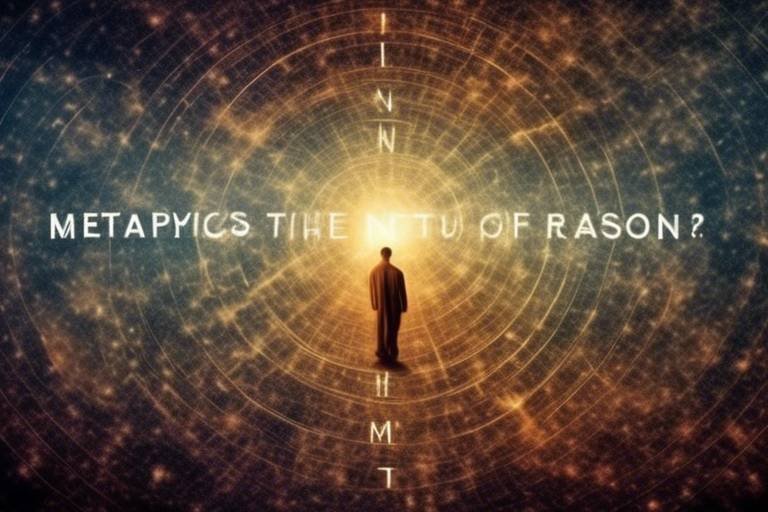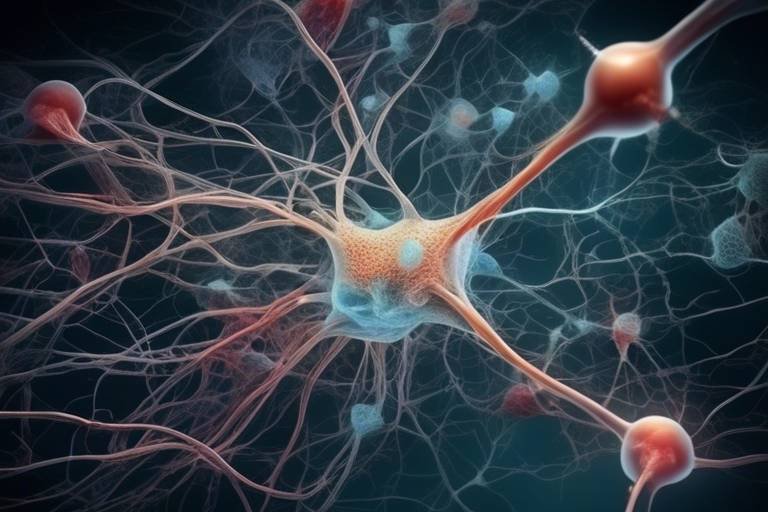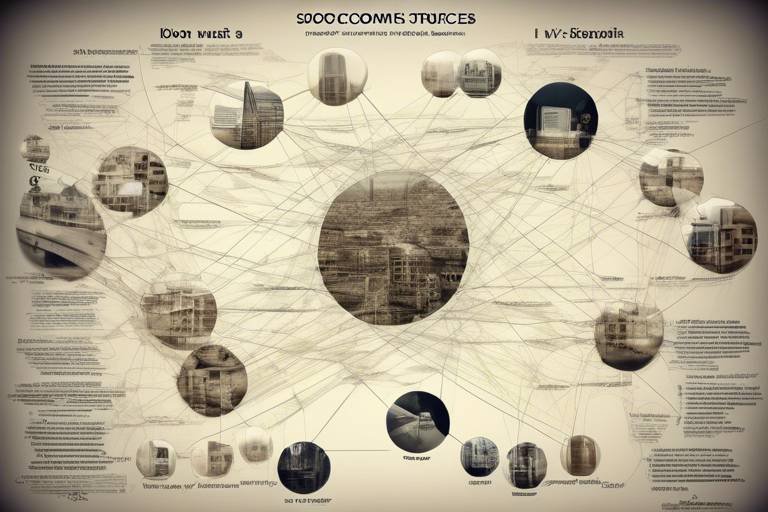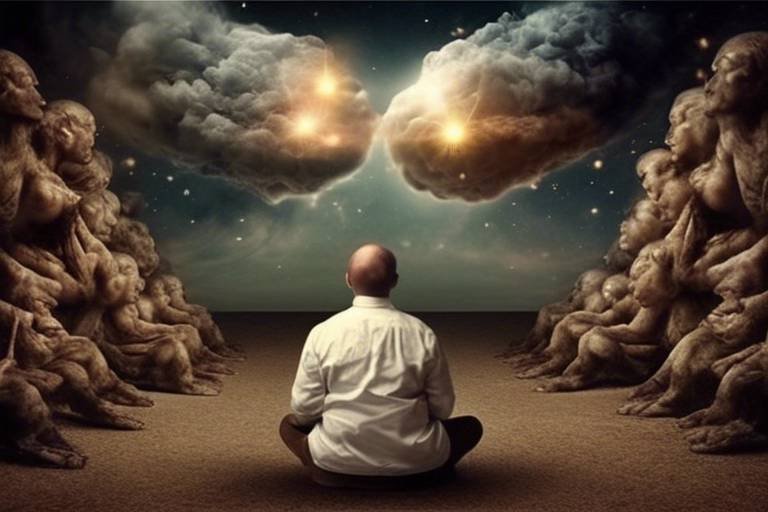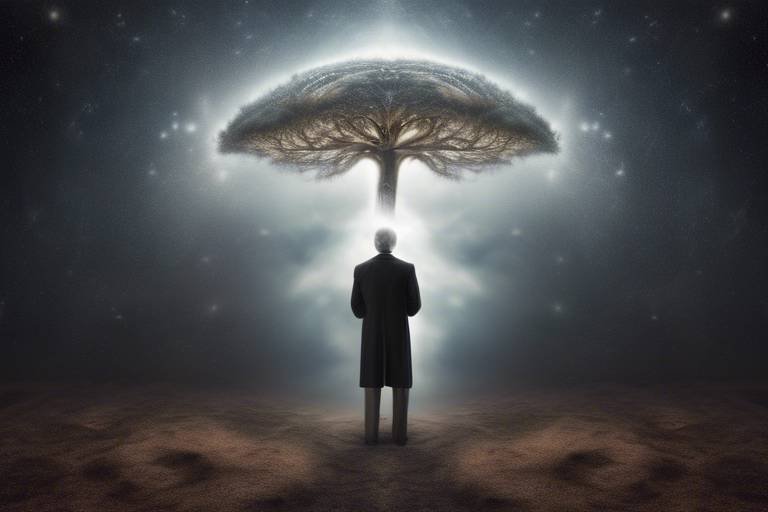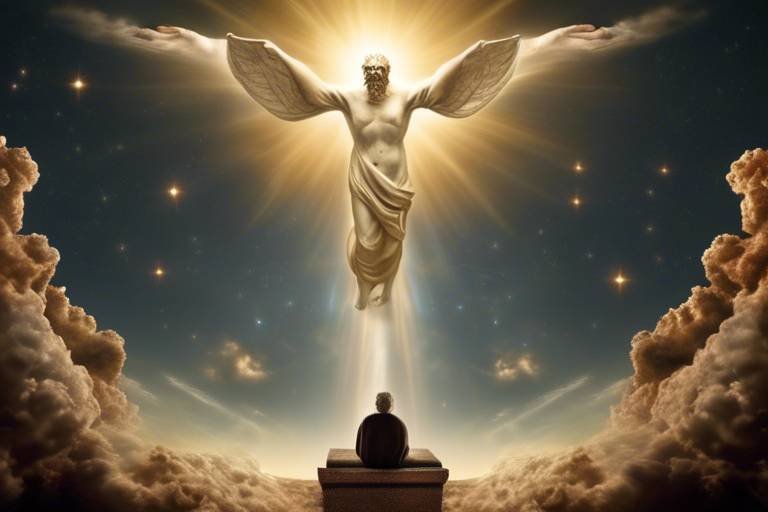Investigating Parallel Universes: A Metaphysical Perspective
The concept of parallel universes has long captivated the imagination of scientists, philosophers, and spiritual seekers alike. Imagine a reality where every choice you make spawns a new universe, each one diverging from the last, creating a complex web of existence that stretches infinitely. It's a tantalizing idea that pushes the boundaries of our understanding of reality and existence. But what does this mean for us? Are we merely players in a cosmic game, or is there something deeper at play? In this article, we delve into the metaphysical implications of parallel universes, exploring their significance through both scientific and spiritual lenses.
At its core, the idea of parallel universes suggests that our observable reality is just one of many. Theories such as the Many-Worlds Interpretation of quantum mechanics propose that every quantum decision creates a branching of universes. This means that for every possible outcome of an event, a new universe is created where that outcome is realized. Such concepts are not merely speculative; they challenge our understanding of time, space, and the very fabric of reality. As we explore these ideas, we find ourselves confronted with questions that defy easy answers. What does it mean to exist in a universe where every possibility is realized? Are we simply one version of ourselves, or are there countless iterations existing simultaneously?
The implications of parallel universes extend far beyond the realm of science. They invite us to ponder profound philosophical questions about our existence and identity. If there are infinite versions of ourselves living out different lives in alternate realities, how do we define who we truly are? This leads us to consider the nature of identity across multiple universes. Are we defined by our choices, or is there a core essence that remains unchanged, regardless of the universe we inhabit?
Parallel universes also present us with existential dilemmas. If every choice creates a new reality, what does that say about the meaning of life? Are we merely wandering through a maze of possibilities, or is there a greater purpose that transcends our individual experiences? The idea that every decision leads to a branching universe can be both liberating and paralyzing. It raises the question: if everything is possible, how do we find meaning in our choices?
When we consider identity across different universes, we encounter a fascinating paradox. If each version of ourselves is shaped by the choices we make, can we truly say that we are the same person in every universe? This brings forth the concept of a singular self existing simultaneously in multiple realities. Are we fragmented beings, or is there a unifying thread that connects all versions of ourselves? The exploration of identity in this context challenges our traditional notions of selfhood and individuality.
Moreover, the ethical implications of parallel universes cannot be ignored. If every choice we make spawns a new reality, what does that mean for our understanding of morality? In a multiverse, does the weight of our decisions diminish when we know that alternate versions of ourselves are living out different outcomes? This raises crucial questions about accountability and the nature of ethical responsibility. Are we morally obligated to consider the consequences of our actions across multiple realities?
As we transition into the scientific realm, we find that contemporary physics offers intriguing support for the idea of parallel universes. Theories such as string theory and the multiverse hypothesis suggest that our universe may be just one bubble in a vast cosmic foam. These scientific explorations push the boundaries of our understanding and invite us to consider the possibility that our reality is not as fixed as we once believed. The intersection of science and metaphysics presents a rich tapestry of ideas that challenge our perceptions of existence.
When we turn to spiritual traditions, we find that many have long embraced concepts akin to parallel universes. Eastern philosophies, for example, often discuss the interconnectedness of all beings and the cyclical nature of existence. Ideas like karma and reincarnation resonate with the notion of multiple realities, suggesting that our actions ripple across different planes of existence. Western mystical traditions also propose alternate realities, often intertwining with scientific understandings in surprising ways.
In Eastern thought, the idea of multiple realities is often linked to the cycle of birth, death, and rebirth. The concept of karma implies that our actions have consequences that extend beyond a single lifetime, creating a web of interconnected experiences across different realities. This perspective encourages a holistic understanding of existence, where every choice reverberates through time and space.
On the other hand, Western mystical traditions delve into the nature of reality through a different lens. They often explore the idea of alternate dimensions and realities, suggesting that our understanding of existence is limited by our perceptions. Mystics propose that through spiritual practices, one can access these alternate realities, offering a profound connection to the universe's greater mysteries.
As we look to the future, the exploration of parallel universes presents exciting avenues for research. Interdisciplinary approaches that merge science, philosophy, and spirituality could yield fascinating insights into the nature of reality. The quest to understand parallel universes is not just an academic endeavor; it is a journey into the heart of existence itself, inviting us to expand our understanding of who we are and the universe we inhabit.
- What are parallel universes? Parallel universes are hypothetical realities that exist alongside our own, often resulting from different outcomes of choices or events.
- How do parallel universes relate to quantum mechanics? The Many-Worlds Interpretation of quantum mechanics suggests that every quantum event creates a branching of universes.
- Can we access parallel universes? While there is currently no scientific evidence to support this, some spiritual traditions suggest that alternate realities can be accessed through meditation or mystical experiences.
- What are the ethical implications of parallel universes? The existence of multiple realities raises questions about moral responsibility and the impact of our choices across different universes.

The Concept of Parallel Universes
The notion of parallel universes has intrigued humanity for centuries, weaving its way through the fabric of science fiction and philosophical discourse. But what exactly are these alternate realities? At its core, the concept suggests that there are multiple, perhaps infinite, universes that coexist alongside our own, each with its own set of physical laws, histories, and outcomes. Imagine a vast cosmic library, where every book represents a different universe, filled with stories that diverge at every decision point. This idea isn't just a fanciful notion; it has roots in various scientific theories and interpretations, such as quantum mechanics and string theory.
One of the most popular interpretations comes from the Many-Worlds Interpretation of quantum mechanics. According to this theory, every time a quantum event occurs—like flipping a coin—there are branches that lead to different outcomes, creating a new universe for each possibility. This means that every decision we make, no matter how small, could spawn a new reality where a different choice was made. It's as if life is a choose-your-own-adventure book that splits into countless narratives with every choice.
But the idea of parallel universes doesn't stop at just quantum mechanics. Theoretical physicists have proposed various models that suggest the existence of these alternate realities. For instance, in string theory, the universe is composed of tiny, vibrating strings that can exist in multiple dimensions. Some of these dimensions could harbor entire universes that interact with our own in ways we can't yet comprehend. This leads to fascinating questions about the nature of reality: Are we truly alone in our universe, or are we just one of many players in an expansive cosmic play?
To further understand this concept, let's explore a few key theories that contribute to the parallel universe hypothesis:
| Theory | Description |
|---|---|
| Many-Worlds Interpretation | Proposes that all possible outcomes of quantum measurements actually occur in separate, branching universes. |
| String Theory | Suggests that fundamental particles are one-dimensional strings, allowing for multiple dimensions and potentially other universes. |
| Cosmic Inflation | Postulates that rapid expansion after the Big Bang could lead to bubble universes, each with different properties. |
As we venture deeper into this topic, it becomes clear that the implications of parallel universes extend beyond mere scientific inquiry. They challenge our understanding of existence, identity, and morality. If there are infinite versions of ourselves living out different lives, what does that mean for the choices we make? Are we merely actors in an endless play, or do our decisions hold weight in the grand tapestry of the multiverse?
In conclusion, the concept of parallel universes invites us to ponder profound questions about our reality and existence. It tantalizes the imagination and beckons us to explore the unknown. As we continue to unravel the mysteries of the universe, the idea of parallel realities serves as a reminder that our understanding of existence is still in its infancy. The more we learn, the more we realize how much we have yet to discover.
- What are parallel universes? Parallel universes are hypothetical self-contained realities coexisting with our own, each with different outcomes and histories.
- How do scientists support the existence of parallel universes? Theories like the Many-Worlds Interpretation and string theory provide frameworks that suggest the possibility of alternate realities.
- What are the philosophical implications of parallel universes? They raise questions about existence, identity, and morality, challenging our understanding of choice and consequence.

Philosophical Implications
The concept of parallel universes opens up a treasure trove of that challenge our understanding of reality, existence, and identity. Imagine a world where every choice you make spawns a new universe—each one a reflection of a different decision. This notion not only tickles the imagination but also raises profound questions about what it means to exist. If there are countless versions of ourselves living in different realities, how do we define our identity? Are we merely a collection of choices, or is there something deeper that ties our various selves together?
One of the most intriguing aspects of this discussion is the existential questions that parallel universes pose. For instance, if every possible outcome of our lives is played out in some universe, what does that say about the meaning of life? Are we simply wandering through a cosmic game of chance, or do our choices have inherent significance? The idea of infinite possibilities can feel liberating yet daunting, as it suggests that every decision, no matter how trivial, creates a ripple effect that reverberates through the multiverse. This leads us to ponder: does our reality hold more weight than those of our alternate selves?
At the heart of this philosophical quandary lies the question of existence itself. If we accept the idea of parallel universes, we must confront the implications of our choices and the nature of our existence. Are we the sum of our decisions, or is there a core essence that defines us regardless of the universe we inhabit? This brings us to the notion of identity across universes. In a multiverse framework, can we truly claim a singular self? Or are we merely a series of interconnected experiences, each one shaping our understanding of who we are?
When we think of identity, we often envision a linear narrative—our life story unfolding in a single dimension. However, the existence of parallel universes complicates this narrative. If different versions of ourselves exist in alternate realities, does that mean our identities are fragmented across these dimensions? In a way, it's like looking into a funhouse mirror that reflects not just one image, but a multitude of selves, each shaped by different experiences and choices. This leads to a fascinating contemplation: is our identity fluid, constantly shifting based on the universe we find ourselves in, or is there a fixed core that remains unchanged?
As we explore these philosophical implications, we must also consider the moral dimensions of parallel universes. If every action we take creates a new reality, how do we navigate the ethics of our choices? In a multiverse, does the weight of our decisions change when we know that alternate outcomes exist? For example, if we make a morally questionable choice, we might justify it by thinking, "In another universe, I made a better decision." This can lead to a slippery slope where we absolve ourselves of responsibility, believing that our actions are inconsequential in the grand scheme of the multiverse. Thus, the ethical implications of parallel universes challenge us to reconsider our understanding of morality and accountability.
In conclusion, the philosophical implications of parallel universes are vast and complex, inviting us to rethink our notions of existence, identity, and morality. As we delve deeper into these ideas, we find ourselves at the intersection of science and philosophy, where the boundaries of reality blur and the possibilities become endless. The exploration of parallel universes not only expands our understanding of the cosmos but also enriches our perspective on what it means to be human.
- What are parallel universes? Parallel universes are hypothetical self-contained realities co-existing with our own, each with its own laws of physics, histories, and outcomes.
- How do parallel universes relate to philosophy? They challenge our understanding of existence, identity, and morality, prompting profound questions about the nature of reality.
- Can our choices affect parallel universes? Yes, the idea suggests that every choice creates a new universe, leading to different outcomes based on those decisions.
- What are the ethical implications of parallel universes? They raise questions about responsibility and accountability for our actions, as alternate realities may allow for justifications of morally questionable choices.

Existential Questions
When we dive into the concept of parallel universes, we can't help but stumble upon a myriad of that challenge our very understanding of life and reality. Imagine standing at a crossroads, each path leading to a different version of you—one where you pursued your dream job, another where you took a leap of faith into the unknown. This thought alone can send shivers down your spine, igniting a curiosity that is both thrilling and terrifying.
At the heart of these musings lies a fundamental question: What does it mean to truly exist? If there are infinite versions of ourselves living out different choices and outcomes, how do we define our identity? Are we merely a collection of decisions made in one universe, or do we have an essence that transcends these realities? This leads us to consider the implications of infinite possibilities. Each choice we make could potentially branch off into a new universe, creating a tapestry of lives that are both uniquely ours and yet entirely different.
Furthermore, the existence of parallel universes prompts us to reflect on the meaning of life. If every conceivable outcome exists somewhere in the multiverse, does that dilute the significance of our struggles and triumphs? Are our aspirations less meaningful if they can be realized in another universe? This brings to light a paradox: the more possibilities there are, the more precious our current reality becomes. It’s as if we are holding a fragile glass ornament, aware that while it may shatter, its beauty is in the moment we experience it.
To delve deeper, let’s entertain a few thought-provoking questions:
- Does knowing that other versions of ourselves exist change how we approach our decisions?
- If we could access these alternate realities, would we want to? What would that mean for our sense of self?
- How do we reconcile the idea of fate with the freedom of choice in a multiverse?
As we ponder these existential dilemmas, we must also consider how they shape our understanding of morality. In a multiverse where every action spawns a new reality, does our sense of right and wrong shift? If a version of ourselves makes a morally questionable choice in one universe, does that taint the integrity of our identity in another? These questions beckon us to re-evaluate our ethical frameworks and challenge the absolutes we often take for granted.
In essence, the exploration of parallel universes is not just a scientific or philosophical endeavor; it’s a deeply personal journey that compels us to confront our own existence. It invites us to reflect on the choices we make and the lives we lead, all while reminding us that we are part of a vast, intricate tapestry of realities. So, as we traverse this fascinating landscape of infinite possibilities, let us embrace the uncertainty and wonder that comes with it.

Identity Across Universes
The concept of identity across parallel universes is a captivating and often perplexing topic that invites us to ponder the very essence of who we are. Imagine, if you will, a vast tapestry of realities, each thread representing a different version of yourself. In one universe, you might be a renowned artist, while in another, you could be a groundbreaking scientist. This brings us to a fundamental question: does a singular self exist across all these realities, or are we merely a collection of possibilities, each version of ourselves living out a unique narrative?
To explore this idea further, we can consider the implications of our choices and experiences in a multiverse context. Each decision we make could potentially create a branching path, leading to a different universe where the outcomes of those choices manifest. For instance, if you decided to pursue a career in music instead of finance, there exists a universe where that choice has shaped your identity entirely differently. This notion challenges our understanding of identity as something fixed and singular, suggesting instead that it is fluid and multifaceted.
Furthermore, the question of whether we retain our core identity across these alternate realities is intriguing. Are we still 'us' if our experiences and choices diverge so significantly? Some philosophers argue that our identity is tied to our consciousness and memories, which may vary dramatically from one universe to another. In this light, it becomes essential to consider how we define ourselves. Is it through our actions, our thoughts, or the relationships we cultivate? The answers to these questions might differ vastly depending on which universe you find yourself in.
In addition, let's not forget the psychological aspect of identity in parallel universes. The idea that there are countless versions of ourselves can be both liberating and daunting. It can evoke feelings of empowerment, knowing that we have the potential to explore different facets of our identity. However, it can also lead to an existential crisis—if there are infinite versions of us, which one is the 'real' us? This dilemma can be likened to standing in front of a funhouse mirror, where each reflection offers a slightly distorted image of who we think we are.
As we delve deeper into the metaphysical implications of identity across universes, we must also consider the interconnectedness of these realities. Could it be possible that our choices in one universe impact those in another? This idea aligns with some interpretations of quantum mechanics, suggesting that all possibilities exist simultaneously, influencing one another in ways we might not yet comprehend. The exploration of identity across universes, therefore, not only expands our understanding of self but also challenges the very fabric of reality.
In conclusion, the exploration of identity in parallel universes opens a Pandora's box of philosophical inquiries. It invites us to reflect on the nature of self, the impact of our choices, and the interconnectedness of our experiences across multiple realities. The more we ponder these questions, the more we realize that our understanding of identity may be just as expansive and complex as the multiverse itself.
- What is a parallel universe? A parallel universe is a hypothetical self-contained reality co-existing with our own, where different versions of events may unfold.
- How does identity differ across universes? Identity can vary based on the choices and experiences unique to each universe, leading to different versions of oneself.
- Can our choices in one universe affect another? Some theories suggest that the interconnectedness of realities may allow for influences between parallel universes, although this remains a topic of debate.
- What philosophical questions arise from the concept of parallel universes? Questions about existence, identity, and the nature of reality itself are central to discussions surrounding parallel universes.

Moral Considerations
The concept of parallel universes invites us to ponder a multitude of moral dilemmas that stretch the fabric of our ethical understanding. Imagine a world where every choice you make spawns a new universe, each with its own set of consequences. This raises profound questions: If there are infinite versions of ourselves making different decisions, what does that say about our accountability? Are we still responsible for our actions, knowing that alternate realities exist where we might have chosen differently?
In a multiverse scenario, the traditional notions of right and wrong become increasingly complex. For instance, let’s consider a simple decision like choosing to help a stranger or walk past them. In one universe, your act of kindness leads to a chain of positive events, while in another, your indifference might result in a negative outcome. Does this mean that every choice we make is less significant? Or does it enhance the weight of our decisions, knowing they ripple through countless realities?
Furthermore, the question of moral responsibility arises. If we can conceive of a universe where our actions are justified, does that absolve us of guilt in our current reality? It’s akin to the philosophical thought experiment of the "trolley problem," where choosing to save one life over another can lead to endless debates about morality. In a multiverse, the implications of such choices could manifest in ways we cannot even begin to comprehend.
Moreover, we must consider the ethical implications of our decisions in relation to others. If every individual exists in multiple universes, does that mean their moral standings are also fragmented? For example, if a person chooses to commit a crime in one universe but lives as a saint in another, how do we judge their character? This fragmentation of identity can lead to a sense of moral ambiguity, where the lines between good and evil blur. It’s like trying to define a color that exists only in a spectrum we cannot see.
Ultimately, the moral considerations of parallel universes challenge us to rethink our understanding of choice, consequence, and accountability. They compel us to ask whether our current ethical frameworks are sufficient to navigate the complexities of infinite realities. As we explore these ideas, we may find that the essence of morality lies not just in the actions we take, but in the intentions behind them, regardless of the universe in which we find ourselves.
- What are parallel universes? Parallel universes are hypothetical self-contained realities that exist alongside our own, each with its own unique laws of physics and outcomes.
- How do parallel universes affect our understanding of morality? They complicate our notions of accountability and moral responsibility, as different choices in alternate realities can lead to vastly different outcomes.
- Are there any scientific theories that support the existence of parallel universes? Yes, theories such as the Many-Worlds Interpretation of quantum mechanics suggest that every possible outcome of a decision creates a new universe.
- Can spiritual beliefs align with the concept of parallel universes? Many spiritual traditions explore ideas of interconnectedness and multiple realities, providing a rich ground for dialogue between science and spirituality.

Scientific Perspectives
When we talk about parallel universes, it might sound like something straight out of a science fiction movie, but the truth is that contemporary science has been flirting with this mind-boggling idea for quite some time now. The concept of parallel universes, or the multiverse, isn't just a whimsical notion; it emerges from serious scientific theories that challenge our understanding of reality. One of the most notable frameworks comes from quantum mechanics, particularly the many-worlds interpretation proposed by Hugh Everett III in the 1950s. This theory suggests that every decision we make creates a branching of the universe, leading to an infinite number of realities where every possible outcome occurs.
Another significant player in the parallel universe debate is the field of cosmology. Here, scientists explore the idea that our universe is just one bubble in a vast sea of universes, each with its own unique properties and laws of physics. This notion is supported by advancements in string theory, which posits that multiple dimensions exist beyond our observable three-dimensional space. In essence, the universe could be part of a grander scheme, where countless other universes exist, some of which may be completely alien to our own.
Now, you might be wondering: how do scientists even begin to test such a far-fetched idea? While direct evidence of parallel universes remains elusive, researchers are constantly searching for indirect signs. For instance, the cosmic microwave background radiation—the afterglow of the Big Bang—might hold clues. Some scientists theorize that anomalies in this radiation could indicate interactions with other universes. Moreover, experiments at particle accelerators like the Large Hadron Collider (LHC) may eventually reveal particles or phenomena that suggest the existence of other dimensions or universes.
To further illustrate the scientific perspectives surrounding parallel universes, let’s take a look at a simplified table summarizing some of the key theories and their implications:
| Theory | Proponent | Key Implications |
|---|---|---|
| Many-Worlds Interpretation | Hugh Everett III | Every quantum decision branches into multiple realities. |
| String Theory | Various Scientists | Multiple dimensions could exist beyond our perception. |
| Cosmic Inflation | Alan Guth | Our universe may be one of many bubbles in a vast multiverse. |
As we delve deeper into the mysteries of the universe, the scientific community continues to grapple with the implications of parallel universes. The intersection of physics and philosophy is becoming increasingly blurred, as scientists and thinkers alike ponder questions about existence, reality, and our place in the cosmos. Could it be that every choice, every moment, creates a ripple effect through the fabric of reality, giving birth to alternate versions of ourselves? The answers remain tantalizingly out of reach, but the journey to uncover them is an exhilarating ride through the unknown.
- What are parallel universes? Parallel universes are hypothetical self-contained realities co-existing with our own, often explored in the context of quantum mechanics and cosmology.
- How do scientists study parallel universes? While direct evidence is lacking, scientists look for indirect signs through cosmic background radiation and particle physics experiments.
- What is the many-worlds interpretation? It's a theory in quantum mechanics suggesting that all possible outcomes of quantum measurements actually occur in separate, branching universes.
- Are there any practical applications of parallel universe theories? Currently, these theories are more philosophical and speculative, but they may influence future technologies and our understanding of reality.

Spiritual Interpretations
The concept of parallel universes is not just a scientific curiosity; it resonates deeply within the realms of spirituality and metaphysics. Many spiritual traditions offer unique interpretations of the multiverse, weaving together threads of existence that challenge our conventional understanding of reality. These interpretations often suggest that our lives are not confined to a single narrative but are part of a vast tapestry of interconnected experiences across multiple dimensions.
One of the fascinating aspects of spiritual interpretations is how they align with or diverge from scientific theories about parallel universes. For instance, in **Eastern philosophies**, the ideas of karma and reincarnation can be seen as reflections of a multiverse. In these traditions, every action has consequences that ripple through various lives and realities. This can lead to the notion that our choices in one universe might impact our experiences in another, creating a complex web of cause and effect that transcends time and space. Imagine living multiple lives, each one influencing the next, like a series of interconnected stories in a grand cosmic library.
On the other hand, **Western mysticism** offers its own perspective on alternate realities. Many mystical traditions propose that there exist realms beyond our physical world, where souls journey and learn. These beliefs often emphasize the idea of a **higher self** that exists outside of time and space, navigating through various realities. This notion can be compared to a traveler exploring different landscapes, each representing a unique experience or lesson. Such interpretations not only enrich our understanding of existence but also invite us to consider the implications of our choices and the interconnectedness of all beings.
In addition to these philosophical insights, spiritual interpretations of parallel universes often raise profound questions about the nature of consciousness. Are we merely products of our environment, or do we possess a deeper essence that connects us to all realities? This inquiry leads us to explore how our thoughts and intentions might shape our experiences across different universes. It’s as if we are artists, painting our lives on a cosmic canvas, where every brushstroke creates ripples in the fabric of existence.
As we delve deeper into these spiritual interpretations, it becomes clear that the concept of parallel universes invites us to reflect on our beliefs about life, death, and the nature of reality itself. It challenges us to expand our consciousness and embrace the idea that existence is not a singular path but a multitude of possibilities. This perspective can be incredibly liberating, as it encourages us to let go of rigid definitions of self and reality, opening our minds to the vast potential that lies before us.
Ultimately, the exploration of parallel universes through a spiritual lens serves as a reminder that we are all interconnected, not just within our own lives but across a multitude of realities. By embracing this interconnectedness, we can foster a greater sense of compassion and understanding for ourselves and others, recognizing that we are all part of a larger cosmic journey.
- What are parallel universes? Parallel universes are hypothetical realities that exist alongside our own, potentially containing different versions of ourselves and alternate outcomes of events.
- How do spiritual traditions view parallel universes? Many spiritual traditions see parallel universes as interconnected realms where our actions and choices can influence multiple outcomes across different realities.
- Can our choices affect our lives in other universes? Yes, in many spiritual interpretations, our choices are believed to have ripple effects across various realities, impacting our experiences in other lives.
- Are parallel universes scientifically proven? While there are theories in physics that suggest the possibility of parallel universes, they remain largely speculative and have not been empirically proven.

Eastern Philosophies
When we think about , a rich tapestry of ideas emerges, weaving together concepts of existence, consciousness, and the universe. Traditions such as Buddhism, Hinduism, and Taoism offer profound insights into the nature of reality, often suggesting that our understanding of the universe is far more complex than the mere physical world we perceive. For instance, in Buddhism, the notion of dependent origination posits that all phenomena arise in relation to one another, hinting at a web of interconnected realities that could potentially align with the idea of parallel universes.
In Hinduism, the concept of maya—the illusion of the physical world—suggests that our reality is but a shadow of a deeper truth. This aligns beautifully with the notion of multiple realities, where each universe might represent a different facet of the ultimate reality, or Brahman. The interplay between karma and reincarnation in this framework raises intriguing questions about how actions in one life might echo across different realities, creating a ripple effect that transcends time and space.
Moreover, Taoism introduces the idea of the Tao as the fundamental principle that flows through all things, suggesting that there are multiple paths and realities that one can traverse. This fluidity mirrors the scientific theories of the multiverse, where countless universes exist, each with its own unique characteristics and laws. The Taoist perspective encourages us to embrace the mysteries of existence, inviting us to ponder how our choices shape not just our reality, but potentially others as well.
To further illustrate these concepts, consider the following table that summarizes key ideas from these Eastern philosophies in relation to parallel universes:
| Philosophy | Key Concept | Relation to Parallel Universes |
|---|---|---|
| Buddhism | Dependent Origination | Interconnected realities influencing one another |
| Hinduism | Maya and Karma | Illusion of reality with actions impacting multiple lives |
| Taoism | The Tao | Fluidity of existence and multiple paths |
As we explore these philosophies, it becomes clear that the idea of parallel universes is not merely a scientific hypothesis but a profound metaphysical inquiry that challenges our understanding of existence. The intersection of these ancient teachings with modern scientific theories opens up a dialogue that invites us to question our perceptions of reality. Can we truly grasp the essence of existence if we only consider one universe? Or do we need to embrace the possibility of many? This is the beauty of Eastern philosophies—they encourage us to explore these profound questions, expanding our horizons and deepening our understanding of the cosmos.
- What are parallel universes? Parallel universes are hypothetical self-contained realities co-existing alongside our own, each with different versions of events and outcomes.
- How do Eastern philosophies relate to parallel universes? Eastern philosophies often discuss interconnectedness and the illusion of reality, which can align with the concept of multiple realities or parallel universes.
- Can our actions in one universe affect another? Many Eastern traditions, particularly Hinduism, suggest that our actions (karma) can have effects beyond our immediate reality, hinting at a broader cosmic influence.

Western Mysticism
Western mysticism is a fascinating tapestry woven from various threads of spiritual beliefs, esoteric traditions, and philosophical inquiries. At its core, it suggests that there are realms beyond our immediate perception, much like the hidden layers of an onion. Just as each layer reveals something new, Western mysticism posits that alternate realities exist, waiting to be discovered. This perspective often intertwines with the idea of parallel universes, suggesting that these realms are not merely figments of imagination but rather tangible aspects of a larger cosmic reality.
One of the most intriguing aspects of Western mysticism is its historical roots. Think about the ancient Gnostics, who believed in a divine spark within each individual, capable of transcending the material world. They hinted at a reality where multiple dimensions coexist, each offering different paths to enlightenment. Similarly, the Hermetic tradition, attributed to Hermes Trismegistus, explores the connection between the microcosm (the individual) and the macrocosm (the universe). This relationship suggests that understanding oneself can unlock the mysteries of the multiverse.
Moreover, the mystical experiences described by various Western traditions often reflect encounters with alternate realities. For instance, the Kabbalistic teachings of Judaism introduce the concept of the Sefirot, which are ten attributes through which the Divine interacts with the world. These attributes can be likened to different dimensions of existence, each offering unique insights into the nature of reality. Similarly, Christian mystics like Meister Eckhart and St. John of the Cross spoke of transcending the physical realm, hinting at the existence of spiritual dimensions that parallel our own.
In contemporary times, the intersection of Western mysticism and modern physics has sparked intriguing discussions. Quantum mechanics, with its bizarre implications of superposition and entanglement, resonates with the mystical idea of interconnected realities. Just as particles can exist in multiple states simultaneously, mystics argue that our consciousness may navigate through various planes of existence. This intersection raises profound questions: Are we merely observers in a single universe, or do we possess the ability to traverse multiple realities?
To further explore these ideas, let’s consider some key themes in Western mysticism that relate to parallel universes:
- Interconnectedness: The belief that all beings and realities are linked, suggesting that actions in one universe can affect another.
- Transformation: The idea that spiritual growth can lead to shifts in perception, allowing individuals to experience alternate realities.
- Divine Unity: Many mystics assert that beneath the surface of apparent diversity lies a singular, unified source, akin to the multiverse theory's concept of a shared origin.
As we delve deeper into Western mysticism, it's essential to recognize its rich tradition of symbolism and metaphor. Mystics often use allegories to express complex ideas about existence and consciousness. For instance, the concept of the Tree of Life in Kabbalah serves as a map of spiritual evolution, illustrating how one might navigate through various states of being, akin to traversing different universes. Similarly, alchemical symbols represent the transformation of the self, echoing the journey through parallel realities.
In conclusion, Western mysticism offers a profound lens through which we can explore the concept of parallel universes. By examining the interconnectedness of existence, the transformative nature of consciousness, and the quest for divine unity, we find a rich dialogue between ancient wisdom and modern scientific inquiry. This ongoing exploration invites us to ponder our place in the cosmos and consider the myriad possibilities that lie beyond our immediate perception.
- What is Western mysticism? Western mysticism encompasses various spiritual and philosophical traditions that explore the nature of reality, existence, and the divine, often suggesting the existence of alternate realities.
- How do parallel universes relate to Western mysticism? Many Western mystical traditions propose that multiple dimensions or realities exist, which can be understood through spiritual practices and insights.
- Can modern science support the ideas of Western mysticism? Yes, concepts from quantum mechanics and other scientific theories resonate with mystical ideas, suggesting a deeper interconnectedness of all existence.

Future Research Directions
As we stand on the precipice of understanding the enigmatic concept of parallel universes, the future beckons with a plethora of research directions that promise to deepen our grasp of this captivating subject. The intersection of science, philosophy, and spirituality offers fertile ground for inquiry, and researchers are beginning to recognize the potential for interdisciplinary studies that could illuminate the mysteries of alternate realities.
One exciting avenue for future research is the integration of quantum physics and metaphysics. Quantum mechanics, with its peculiarities like superposition and entanglement, suggests that particles can exist in multiple states simultaneously. This phenomenon could serve as a springboard for exploring how these scientific principles might relate to the existence of parallel universes. By examining the implications of quantum theory through a metaphysical lens, researchers could uncover profound insights into the nature of reality itself.
Additionally, exploring the psychological effects of belief in parallel universes could yield fascinating results. How does the idea of multiple realities influence our decision-making, our understanding of identity, and our moral frameworks? Conducting studies that analyze the psychological impact of these beliefs could provide a deeper understanding of human behavior in the context of a multiverse. For instance, consider how the knowledge of infinite possibilities might affect a person's choices, motivations, and overall outlook on life.
Furthermore, as technology advances, the potential for empirical research into parallel universes grows. Innovations in fields like cosmology and astrophysics could lead to new methods for detecting evidence of alternate realities. For example, experiments designed to observe cosmic background radiation may reveal anomalies that suggest the presence of parallel dimensions. Such findings would not only bolster theoretical frameworks but also challenge existing scientific paradigms.
Another promising direction is the exploration of cultural narratives surrounding parallel universes. How do different societies conceptualize the multiverse? By analyzing folklore, mythology, and religious texts across cultures, researchers can uncover diverse interpretations and beliefs that shape our understanding of existence. This cultural perspective can enrich scientific discourse by providing a broader context for the implications of parallel universes on human thought and society.
Finally, a collaborative approach that brings together physicists, philosophers, and spiritual leaders could pave the way for holistic understanding. By fostering dialogues that bridge these disciplines, we can explore the ethical and moral considerations of living in a multiverse. Questions about accountability, choice, and the nature of good and evil become even more complex when viewed through the lens of infinite realities. Engaging in these discussions could lead to a more nuanced perspective on our responsibilities as conscious beings within a vast multiverse.
In conclusion, the future of research on parallel universes is bright and filled with potential. As we continue to probe the depths of this fascinating topic, the interplay between science, philosophy, and spirituality will undoubtedly yield insights that challenge our perceptions and expand our understanding of existence itself.
- What are parallel universes? Parallel universes, or the multiverse, refer to the idea that there are multiple, possibly infinite, universes that exist alongside our own, each with different realities and possibilities.
- How do scientists study parallel universes? Scientists study parallel universes through theoretical physics, particularly in the realms of quantum mechanics and cosmology, looking for evidence that supports or contradicts the existence of these alternate realities.
- What are the philosophical implications of parallel universes? The existence of parallel universes raises profound questions about identity, morality, and the meaning of existence, challenging our understanding of self and choice in a multiverse context.
- Can spirituality and science coexist in understanding parallel universes? Yes, many believe that spirituality and science can complement each other in exploring the concept of parallel universes, as both seek to understand the nature of reality and our place within it.
Frequently Asked Questions
- What are parallel universes?
Parallel universes, also known as multiverses, refer to the theoretical existence of multiple, perhaps infinite, realities that exist alongside our own. Each universe may have different versions of events, laws of physics, and even different forms of life. Imagine a vast library where every book represents a different universe, each telling its own unique story!
- How do scientists support the idea of parallel universes?
Scientists support the idea of parallel universes through various theories in physics, particularly in quantum mechanics and cosmology. For instance, the Many-Worlds Interpretation suggests that every quantum decision creates a branching of universes. It's like flipping a coin—each flip doesn't just land on heads or tails; it creates a whole new universe for each outcome!
- What philosophical questions arise from the concept of parallel universes?
The existence of parallel universes raises profound philosophical questions about existence, identity, and morality. If every possible choice leads to a different universe, what does that say about our free will? Are we defined by our choices, or are we merely players in a cosmic game with countless outcomes?
- Can our identity exist in multiple universes?
Yes, the concept of identity across multiple universes is a fascinating topic. Some philosophers argue that a singular self can experience different lives in various realities, while others suggest that each version of ourselves is distinct. It's like being an actor playing different roles in a series of films—each character has their own story, yet they all share the same actor!
- What are the spiritual interpretations of parallel universes?
Many spiritual traditions interpret parallel universes as interconnected realms that reflect our choices and actions. For example, Eastern philosophies like Buddhism and Hinduism often discuss concepts like karma and reincarnation, suggesting that our actions in one life can affect our existence in another. It's like a cosmic web where every thread influences the others!
- What moral implications come with the idea of multiple realities?
The moral implications of parallel universes are intriguing. If every choice leads to a different reality, does that mean we bear less responsibility for our actions? Or does it challenge us to consider the impact of our decisions across all possible worlds? It's a moral puzzle that invites us to reflect deeply on our values and choices!
- What future research is needed in the study of parallel universes?
Future research on parallel universes should focus on interdisciplinary approaches that merge insights from science, philosophy, and spirituality. This could lead to a more comprehensive understanding of reality and our place within it. The quest for knowledge is like a journey through the cosmos—endless and full of surprises!


